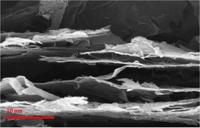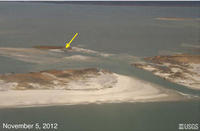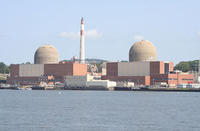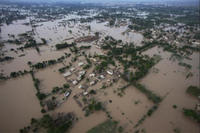-
DHS: Industrial control systems subject to 200 attacks in 2012
A DHS report released last week revealed that industrial control systems, which are used to monitor and control critical infrastructure facilities, were hit with 198 documented cyberattacks in 2012, and that many of these attacks were serious.
-
-
U.K. revises nuke emergency plans post-Fukushima
The Sizewell nuclear power station in Suffolk, England, was decommissioned in 2006, but after the 2011 Fukushima disaster, the Suffolk authorities thought there was a need to upgrade the emergency plans for the people living around the plant. There are disagreements, however, over the radius of the emergency zone around the plant, and how many people should be included i evacuation plans and given potassium iodide tablets in the event of a radiation leak.
-
-
Tiny helpers: Atom-thick flakes help clean up radioactive waste, fracking sites

Graphene oxide has a remarkable ability quickly to remove radioactive material from contaminated water. Researchers determined that microscopic, atom-thick flakes of graphene oxide bind quickly to natural and human-made radionuclides and condense them into solids. The discovery could be a boon in the cleanup of contaminated sites like the Fukushima nuclear plants, and it could also cut the cost of hydraulic fracturing (“fracking”) for oil and gas recovery and help reboot American mining of rare earth metals.
-
-
Students develop low-cost water filtering system for African nation
Every year, 3.4 million people die from lack of access to fresh water globally; in East Africa, daily routines include women venturing miles to secure fresh water and bearing the heavy weight of water containers to secure less-than-desirable water; in an effort to bring fresh water to rural Kenyans, Penn State’s School of International Affairs (SIA) students have developed a ceramic water filtration system for parts of the sub Saharan African nation
-
-
Shoring up Long Island’s natural shore defenses against future storms

Sand and other coarse-grained sediments are vital to the naturally occurring barrier systems which dissipate storm surges, protect coastal residences, and shelter biologically diverse estuaries and ecosystems; a team of researchers is conducting marine geophysical surveys of the seafloor and shallow subsurface to assess the health of the offshore barrier system which protects the New York Harbor and southwestern Long Island region against damage from future storms
-
-
New York State power plants showing their age

New York State could face power plant closings in the near future as a result of updated environmental regulations and the fact that plants in the state are outdated and inefficient; a recent report concluded that New York’s coal and nuclear power plants, as well as steam and turbine plants that run on oil or gas, are on average older than others around the country
-
-
Before the deluge: improving flood forecasting

Summer 2012 was the third consecutive summer in which Pakistan has endured catastrophic floods; thirty million people were affected in 2010 and 2011; the summer 2012 floods affected 4.7 million more, killed nearly 500 people, and led to the evacuation of 350,000; Pakistan, stubbornly refusing to accept external assistance in flood forecasting, is not able to predict and prepare for natural disasters on its own
-
-
Appearances deceive: supposedly “stable” zone make earthquakes even more powerful
In an earthquake, ground motion is the result of waves emitted when the two sides of a fault move — or slip — rapidly past each other, with an average relative speed of about three feet per second. Not all fault segments move so quickly, however; new earthquake fault models show that “stable” zones may contribute to the generation of massive earthquakes
-
-
France is the forerunner in nuclear power generation – but for how long?
France has been held up, worldwide, as the forerunner in using nuclear fission to produce electricity; a third of the nation’s nuclear reactors, however, will need replacing in the next decade, and public opinion has shifted toward reducing reliance on nuclear power; does France have the means or desire to unplug from nuclear power?
-
-
"Prophylactic dressing" for walls make buildings safer during earthquakes
In the case of earthquakes, only seconds may remain for a safe escape from buildings; debris falling down and obstructing the escape routes may even aggravate the situation; a new product extends the time for saving lives by reinforcing walls and keeping off the debris; an innovative building material manufacturer now has launched the mature innovation in the market
-
-
Assessing future sea level rise from ice sheets
Future sea level rise due to the melting of the Greenland and Antarctic ice sheets could be substantially larger than estimated in Climate Change 2007, the Fourth Assessment Report of the IPCC, according to new research
-
-
Political action the biggest swing factor in meeting climate targets: study
The new study examines the probability of keeping average global temperatures from rising more than 2°C above preindustrial levels under varying levels of climate policy stringency, and thus mitigation costs
-
-
The natural relationship between CO2 concentrations and sea level means that sea level will continue to rise
By comparing reconstructions of atmospheric CO2 concentrations and sea level over the past forty million years, researchers have found that greenhouse gas concentrations similar to the present (almost 400 parts per million) were systematically associated with sea levels at least nine meters above current levels
-
-
Study warns of more powerful quakes in the Himalayas
A research team has discovered that massive earthquakes in the range of 8 to 8.5 magnitudes on the Richter scale have left clear ground scars in the central Himalayas;this discovery has important implications for the area along the front of the Himalayan Mountains, given that the region has a population density similar to that of New York City
-
-
Fiscal cliff discussions get in way of post-Sandy relief measure
The post-Sandy rebuilding effort in the northeast has been stalled by the debate going on in Congress about a solution to the national debt
-
More headlines
The long view
Helping Strengthen America’s Critical Infrastructure
By Corinne Dionisio
Everyday life depends on a robust infrastructure network that provides access to running water, communications technology and electricity, among other basic necessities. The experts who keep our national infrastructure secure and resilient also need a strong network to share their knowledge and train the next generation of professionals capable of solving complex infrastructure challenges.
AI and the Future of the U.S. Electric Grid
By Doug Irving
Despite its age, the U.S. electric grid remains one of the great workhorses of modern life. Whether it can maintain that performance over the next few years may determine how well the U.S. competes in an AI-driven world.
Using Liquid Air for Grid-Scale Energy Storage
By Nancy W. Stauffer
New research finds liquid air energy storage could be the lowest-cost option for ensuring a continuous power supply on a future grid dominated by carbon-free but intermittent sources of electricity.
Enhanced Geothermal Systems: A Promising Source of Round-the-Clock Energy
By Julie Bobyock and Christina Procopiou
With its capacity to provide 24/7 power, many are warming up to the prospect of geothermal energy. Scientists are currently working to advance human-made reservoirs in Earth’s deep subsurface to stimulate the activity that exists within natural geothermal systems.
Experts Discuss Geothermal Potential
By Graeme Beardsmore and Rachel Webster, University of Melbourne
Geothermal energy harnesses the heat from within Earth—the term comes from the Greek words geo (earth) and therme (heat). It is an energy source that has the potential to power all our energy needs for billions of years.
